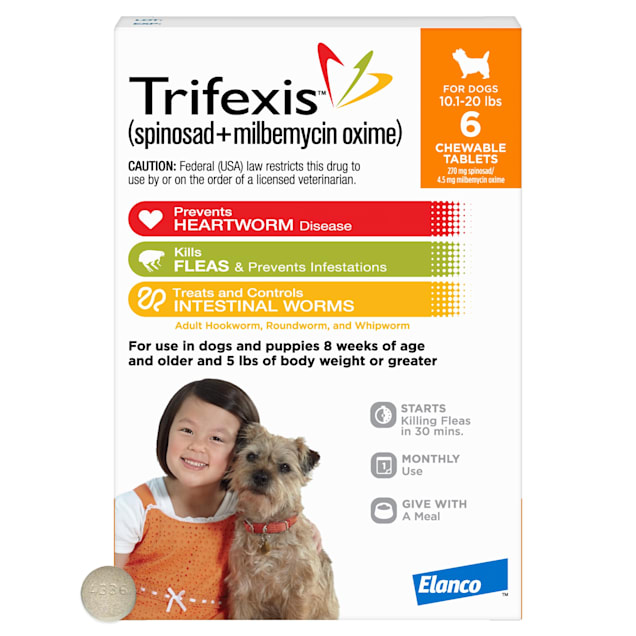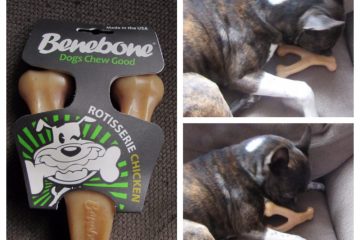A pup shaking its head 10-20 times a day might be a sign of an ear infection, which is common among dogs. Ear infections can be caused by yeast, bacteria, or fungi that build up inside the ears, leading to symptoms such as swelling, inflammation, pain, and oozing.
If your dog is experiencing these symptoms, it’s important to seek veterinary attention for proper diagnosis and treatment. When a pup repeatedly shakes its head throughout the day, it could indicate an underlying issue, such as an ear infection. Ear infections in dogs are predominantly caused by yeast, bacteria, or fungi buildup inside the ears.
These infections can result in various discomforting symptoms like inflammation, pain, swelling, and discharge. To provide the necessary care, it’s crucial to identify the cause and seek professional guidance for appropriate treatment. We will explore the potential causes of head shaking in pups, as well as provide insights on how to address the issue effectively.

Credit: www.ebay.com
Causes Of Head Shaking In Dogs
Head shaking in dogs can be caused by various reasons, with ear infections being the most common culprit. These infections can lead to swelling, inflammation, pain, and oozing in your dog’s ears, causing them to shake their head multiple times a day.
Consulting a vet is recommended for proper diagnosis and treatment.
Head shaking in dogs can be a cause for concern, as it may indicate an underlying problem. Understanding the potential causes can help you identify the issue and seek appropriate treatment. Here are some common causes of head shaking in dogs:
1. Ear Infection
An ear infection is a leading cause of head shaking in dogs. It can be caused by yeast, bacteria, or fungi that build up in the ear canal. This buildup can lead to swelling, inflammation, pain, and oozing. Dogs experiencing an ear infection may shake their heads vigorously to relieve discomfort.
To treat an ear infection, it is important to consult with a veterinarian. They may recommend cleaning the ears and prescribing medication to address the underlying infection. It is not recommended to try treating an ear infection without veterinary guidance.
2. Head Shaking Syndrome
Head shaking syndrome, also known as canine idiopathic head tremor syndrome (IHTS), is a benign condition characterized by sudden, uncontrollable head tremors. These tremors can start and stop spontaneously and are not typically accompanied by other symptoms. While the exact cause of this syndrome is unknown, certain breeds may be more prone to it.
If your dog is experiencing head shaking syndrome, it is best to consult with a veterinarian to rule out any other underlying conditions and ensure proper management of the tremors.
3. Other Possible Causes
In addition to ear infections and head shaking syndrome, there can be other causes for head shaking in dogs. These may include:
- Allergies: Dogs with allergies may experience itching and discomfort, leading to head shaking.
- Foreign Objects: If your dog has a foreign object stuck in their ear, it can cause irritation and prompt head shaking.
- Ear Mites: Infestation of ear mites can cause intense itching and irritation, resulting in head shaking.
If you notice your dog shaking their head frequently, it is important to consult with a veterinarian to determine the underlying cause. They can conduct a thorough examination and recommend appropriate treatment to alleviate any discomfort and resolve the issue.

Credit: www.petco.com
Treating Dog Ear Infections At Home
Does your pup shake his head about 10-20 times a day? This could be a sign of a dog ear infection. Treating dog ear infections at home can help relieve discomfort and prevent further complications. Natural remedies like oil of oregano and apple cider vinegar can be effective in reducing itchiness and discomfort.
However, it’s always best to consult with a vet for proper diagnosis and treatment.
o the vet, who diagnosed him with a dog ear infection. The vet suggested treating the ear infection at home before considering any further medical intervention. Treating dog ear infections at home can be effective, and there are several natural remedies that you can try. In this section, we will explore three natural remedies for dog ear infections: Using Oil of Oregano, Using Apple Cider Vinegar, and Other Natural Remedies.Using Oil Of Oregano
Oil of oregano is a natural antibiotic that can help combat the bacteria or fungi causing the ear infection. To use it for your dog’s ear infection, you can follow these steps:- Add one drop of oil of oregano to ½ oz of warm pure aloe vera juice.
- Clean the visible parts of the ear with a cotton ball soaked in the mixture.
Using Apple Cider Vinegar
Apple cider vinegar has anti-inflammatory and antibacterial properties that can alleviate the itch and discomfort associated with dog ear infections. Here’s how you can use it:- Mix equal parts of apple cider vinegar and purified water.
- Using a dropper, put a few drops of the mixture into your dog’s ear canal.
- Gently massage the base of the ear to allow the mixture to reach the infected areas.
- Let your dog shake its head to remove any excess solution.
Other Natural Remedies
In addition to oil of oregano and apple cider vinegar, there are a few other natural remedies you can try to treat your dog’s ear infection:- Coconut oil: Apply a small amount of melted coconut oil to your dog’s ear and massage it gently. Coconut oil has antimicrobial properties that can help soothe the infection.
- Calendula extract: Dilute calendula extract with water and use it as an ear rinse. Calendula has anti-inflammatory and antifungal properties.
- Chamomile tea: Brew chamomile tea, let it cool, and use it as an ear rinse. Chamomile has soothing properties that can provide relief from itching.
When To See A Vet
If your pup is shaking his head about 10-20 times a day, it may be a sign of an underlying issue. Head shaking can have various causes, but one common cause is an ear infection. Ear infections can occur due to yeast, bacteria, or fungi that build up inside your dog’s ears. This can lead to symptoms such as swelling, inflammation, pain, and oozing. Additionally, your dog may scratch his ears excessively or show signs of itchiness.
Other symptoms that may accompany head shaking include itchy skin, loss of balance, and a strong smell coming from the ears. If you notice any of these symptoms, it’s important to take your dog to the vet for a thorough examination.
Early diagnosis of the underlying cause of your pup’s head shaking is crucial for effective treatment. Delaying a visit to the vet can lead to further discomfort and potential complications for your furry friend. Identifying the problem early on allows the vet to provide timely and appropriate medical care.
By seeing a vet promptly, you can ensure that your dog receives the necessary treatment to alleviate the symptoms and address the root cause of the head shaking. This may involve a physical examination, ear swab for laboratory analysis, and potentially sedation to allow for a deeper evaluation of the ears. With early diagnosis, your vet can prescribe the appropriate medications, such as antibiotics or antifungal treatments, to promote healing and provide relief.
Remember, your veterinarian is the best resource to determine the exact cause of your pup’s head shaking and provide appropriate treatment. If you have any concerns about your dog’s health, make sure to schedule an appointment with your vet as soon as possible.
Preventing Ear Infections In Dogs
If your pup is shaking his head about 10-20 times a day, it could be a sign of an ear infection. Ear infections in dogs are often caused by yeast, bacteria, or fungi, which can lead to swelling, inflammation, pain, and oozing.
It’s important to consult with a vet for proper diagnosis and treatment.
Preventing Ear Infections in Dogs H3: Regular Cleaning Regular cleaning of your dog’s ears is crucial in preventing ear infections. This helps to remove dirt, wax, and any accumulated debris that can lead to irritation and infection. Cleaning your dog’s ears should be done carefully to avoid damaging the delicate structures inside. Here’s how you can clean your dog’s ears properly: 1. Gather the necessary supplies: cotton balls or gauze pads, ear cleaning solution (specifically made for dogs), and treats to reward your pup. 2. Hold your dog’s head steady and gently lift the ear flap. Take care not to insert anything too deep into the ear canal. 3. Moisten a cotton ball or gauze pad with the ear cleaning solution. Make sure it is damp, not dripping wet. 4. Gently wipe the visible part of the inner ear, carefully removing any dirt or wax. Avoid rubbing or scrubbing vigorously, as this can cause further irritation. 5. Use a fresh cotton ball or gauze pad for each ear to prevent cross-contamination. 6. Reward your pup with treats and praise after each successful cleaning session to make it a positive experience for them. H3: Proper Hygiene Practices Maintaining proper hygiene practices is essential for preventing ear infections in dogs. Here are some tips to ensure your dog’s ears stay clean and healthy: 1. Regular grooming: Keep your dog’s fur around the ears trimmed to allow for proper air circulation. This helps to prevent moisture build-up, which can contribute to ear infections. 2. Check for foreign objects: Inspect your dog’s ears regularly for any foreign objects, such as grass seeds or small insects. If you notice anything unusual, consult your vet for proper removal. 3. Dry the ears after swimming or bathing: Moisture can be a breeding ground for bacteria and yeast, leading to ear infections. After your dog swims or takes a bath, gently dry their ears using a soft towel. 4. Avoid excessive moisture: Minimize activities that expose your dog’s ears to excessive moisture, such as walking in the rain or playing in wet grass. If your dog’s ears do get wet, dry them thoroughly afterward. 5. Ensure proper ventilation: Allow your dog’s ears to breathe by keeping them free from excessive dirt, debris, or hair. This can be achieved through regular grooming practices and maintaining a clean living environment. H3: Avoiding Irritants Irritants can also contribute to ear infections in dogs. It is important to identify and avoid these triggers to prevent discomfort and any potential infection. Here are some common irritants to be mindful of: 1. Allergens: Dogs can be allergic to certain substances, including pollen, dust mites, or certain foods. These allergies can cause inflammation and itching, leading to ear infections. Consult your vet to identify and manage any allergies your dog may have. 2. Chemical irritants: Avoid exposing your dog to harsh chemicals or cleaning products that may cause irritation. This includes shampoos or ear cleaning solutions that are not specifically formulated for dogs. 3. Environmental factors: Excessive heat, humidity, or pollution can also irritate your dog’s ears. Avoid exposing your furry friend to extreme environmental conditions whenever possible. By following regular cleaning practices, maintaining proper hygiene, and avoiding irritants, you can greatly reduce the risk of ear infections in your furry friend. Remember that prevention is key, and early detection is crucial in ensuring your dog’s ear health. Regular check-ups with your vet can help monitor and address any potential issues before they worsen. So keep those tails wagging and those ears healthy!Understanding And Managing Head Shaking Syndrome
Managing and understanding head shaking syndrome in dogs is crucial when your pup is experiencing frequent head shaking, which could indicate an ear infection. It’s important to consult a vet for a proper diagnosis and treatment to alleviate symptoms and improve your dog’s comfort.
Natural remedies like oil of oregano and apple cider vinegar can provide relief as well.
Characteristics Of Idiopathic Head Tremors
Idiopathic Head Tremors in dogs are characterized by sudden and uncontrollable head shaking. These tremors can start and stop spontaneously, often lasting for a few minutes at a time. The exact cause of this condition remains unknown, hence the term “idiopathic.” It is important to note that idiopathic head tremors are generally considered benign and not typically associated with any underlying health issues. During an episode of head shaking, dogs may exhibit the following characteristic behaviors: 1. Rapid and repetitive shaking of the head 2. Involuntary twitching or jerking of the head muscles 3. Absence of other neurological symptoms, such as seizures or loss of balance 4. Normal behavior between episodes, with no signs of distress or discomfort It is crucial to have your dog evaluated by a veterinarian to rule out any other potential causes of head shaking, such as ear infections or neurological disorders. Proper diagnosis is essential to ensure appropriate treatment and management of this condition.Treatment And Management Tips
While idiopathic head tremors in dogs do not typically require specific treatment, there are some management strategies that can help reduce the frequency and severity of episodes. Here are a few tips to consider: 1. Minimizing stress: Stress and anxiety can trigger or worsen head shaking episodes in dogs. Creating a calm and peaceful environment for your furry friend can help reduce the frequency of these episodes. 2. Regular exercise: Regular exercise helps promote physical and mental well-being in dogs, reducing overall stress levels and potentially decreasing the occurrence of head tremors. 3. Balanced diet: Providing a well-balanced and nutritious diet to your dog can support overall health and potentially contribute to the management of idiopathic head tremors. 4. Avoiding potential triggers: Observe your dog closely to identify any specific triggers that may worsen the head shaking episodes. Avoiding these triggers, such as certain foods or environmental factors, may help in managing the condition. 5. Medication: In severe cases where the head tremors significantly impact your dog’s quality of life, veterinary-prescribed medications, such as anti-seizure drugs or muscle relaxants, may be considered. However, the use of medication should always be discussed and monitored by your veterinarian. Remember, it is essential to consult with your veterinarian for a proper diagnosis and guidance on the best course of action for managing idiopathic head tremors in your dog. While it can be concerning to witness your pup shaking his head, with proper care and management, you can help ensure a happy and healthy life for your canine companion.
Credit: www.facebook.com
Frequently Asked Questions Of Pup Is Shaking His Head About 10 20 Times A Day
What Does It Mean When A Puppy Shakes His Head A Lot?
Frequent head shaking in puppies may indicate an ear infection caused by yeast, bacteria, or fungi. This can lead to swelling, inflammation, pain, and oozing. It’s important to consult a vet for proper diagnosis and treatment.
How Can I Get Rid Of My Dog’s Ear Infection Without Going To The Vet?
To naturally treat your dog’s ear infection, try using oil of oregano mixed with aloe vera juice. Apply the mixture to the visible parts of the ear using a cotton ball. Apple cider vinegar can also help with itching and discomfort.
However, it’s best to consult a vet for proper diagnosis and treatment.
What Is Head Shaking Syndrome In Dogs?
Head shaking syndrome in dogs, also known as canine idiopathic head tremor syndrome (IHTS), is a benign condition characterized by uncontrolled head tremors. These tremors occur spontaneously and can start and stop on their own. It is important to contact a veterinarian if your dog is shaking their head and scratching their ear frequently to ensure proper diagnosis and treatment.
Conclusion
Shaking his head about 10-20 times a day? Head shaking in dogs can be indicative of several underlying issues, with the most common cause being an ear infection. If you notice your pup constantly shaking his head and scratching his ears, it’s important to consult a vet for a proper diagnosis and treatment.
Prompt intervention can prevent further discomfort and potential complications. Remember, early detection and treatment are key to ensuring your furry friend’s well-being.




